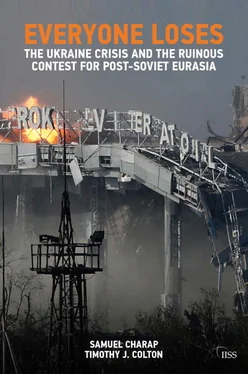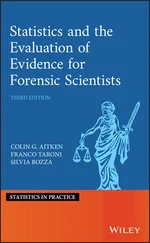As the conflict in eastern Ukraine intensified, the US imposed sanctions that were harsher and more sophisticated than previous measures. In July 2014, the Treasury Department prohibited the financing of debt with a maturity of more than 90 days for several large Russian banks. It was initially unclear whether Brussels would follow suit, as Europe’s extensive economic ties with Russia meant that the blowback from sanctions would be significantly greater for EU member states. Yet the downing of a Malaysia Airlines passenger jet over the Donbas on 17 July altered the political dynamic in Europe. As best we know, flight MH17 was shot down either by a Russian army unit or by rebels who thought they were targeting a Ukrainian military plane.
Putin’s lack of contrition and the various denials of culpability by the Russian government forced the EU governments’ hand. A week after the crash, Brussels imposed similar limits on Russian financial institutions’ access to European capital markets, banning the export of defence and dual-use technology to Russia and keeping the country from acquiring ‘sensitive technologies’ in the oil sector. Over the following weeks, the US and the EU added several financial institutions to the debt-maturity limits list and tightened the limits from 90 to 30 days. The US also issued a supplementary directive forbidding the export of goods, services and technology ‘in support of exploration or production for deepwater, Arctic offshore, or shale projects’ in Russia. [49] ‘Announcement of Expanded Treasury Sanctions within the Russian Financial Services, Energy and Defense or Related Materiel Sectors’, 12 September 2014, https://www.treasury.gov/press-center/press-releases/Pages/jl2629.aspx .
The EU soon matched this step. As a result, ExxonMobil announced in September that it would wind down its operations in the Kara Sea, where the company had been participating in a joint venture with Russian state-owned energy company Rosneft. Economic ties between Russia and the West built up meticulously over 25 years were rent asunder in a matter of months.
On 7 August 2014, Russia reacted with an import ban on agricultural goods and foodstuffs from the US, the EU and other countries that had imposed restrictive measures on it. These sanctions were enacted under the aegis of ‘import substitution’, an idea that became a rallying cry for Russian officialdom with the domestic audience. While the ban provided new opportunities for some Russian producers, its main effect in the short term was inflationary. It also hit the bottom line of the politically well-connected agricultural sector in Europe.
Much like the interaction in the region between Russia and the West before 2014, the diplomatic response to the Ukraine crisis was almost an afterthought. Following their meeting in March, Kerry and Lavrov did not reconvene until a month later when, with the EU’s Ashton and the acting Ukrainian foreign minister, they issued a joint statement in Geneva calling for an end to the carnage in the Donbas. [50] ‘Geneva Statement on Ukraine’, 17 April 2014, http://www.state.gov/r/pa/prs/ps/2014/04/224957.htm .
Regrettably, the statement had no impact on the fighting. With the exception of leader-level and minister-level phone calls, the only events during the next four months that resembled negotiations were side meetings during the 70th anniversary of D-Day in early June.
When talks did occur, little progress was made. Western leaders, pushing their geo-ideational case, argued that the root cause of the crisis was Russia’s aggression against Ukraine that had begun in late February when its people made their choice for a new political order. The West demanded an end to Russia’s belligerence and expected it to respect the will of the Ukrainian people. There was no appetite to negotiate with Moscow about that. As Obama said in July 2014:
The sooner the Russians recognize that the best chance for them to have influence inside of Ukraine is by being good neighbors and maintaining trade and commerce, rather than trying to dictate what the Ukrainian people can aspire to, rendering Ukraine a vassal state to Russia… the sooner we can resolve this crisis. [51] ‘Statement by the President on Ukraine’, 29 July 2014, https://www.whitehouse.gov/the-press-office/2014/07/29/statement-president-ukraine .
He and the Europeans insisted on a cessation of Russian aid to the rebels and a pullback of the Russian troops now deployed along the border. While legally and morally justified, this demand was not a viable basis for talks; Moscow was not going to comply, since doing so would have allowed Ukrainian government forces to crush the insurgency. Russia was not prepared to permit the restoration of government control in the Donbas until it got a deal along the lines of the 15 March document. And neither the West nor Kyiv was willing to negotiate on these terms. While abjuring such a compromise, the West was also – understandably – not ready to escalate to the level required to shake Russia’s determination to pursue its objectives.
Russia’s actions in this period constituted a major roadblock to a diplomatic resolution of the crisis. The annexation of Crimea and stoking of the insurgency in eastern Ukraine not only made dealing with Moscow an order of magnitude more politically fraught; it also forced a reassessment of Russia’s intentions in the West. Western leaders began to question whether Putin’s ambitions extended beyond Ukraine; Russia’s unpredictability was now seen as a huge security problem for the West itself. Uncertainty about Russia’s intentions was compounded by the cognitive dissonance in the interactions between Russian officials and their Western counterparts. By late spring, it became clear that talks at the ministerial level were largely pointless. Two days after signing the Geneva joint statement in April, Lavrov repudiated the document and his Western negotiating partners in an English-language interview. [52] ‘Lavrov to RT: Americans Are “Running the Show” in Ukraine’, RT, 23 April 2014, https://www.rt.com/shows/sophieco/154364-lavrov-ukraine-standoff-sophieco/ .
US officials drew the conclusion that his ‘wings had been clipped’ because he had not been given a clear mandate and had unwittingly crossed a red line. [53] Interview with senior US official, Washington DC, June 2014.
A similar scenario unfolded after Economic Development Minister Aleksei Ulyukaev made a concession in talks on Ukraine’s DCFTA that autumn. [54] See Neil Buckley et al., ‘Battle for Ukraine: How a Diplomatic Success Unravelled’, Financial Times , 3 February 2015, http://www.ft.com/intl/cms/s/2/7cfc8ac6-ab17-11e4-91d2-00144feab7de.html .
Putin had reduced the decision-making group on Ukraine to himself and a few close advisers.
But talking directly to Putin also yielded little. The Ukrainian, US and EU leaders wanted to discuss a pull-out of Russian troops and an end to the conflict in the Donbas; Putin consistently denied that there were any Russian soldiers in Ukraine. He was likely doing so to maintain the veneer of legality and to give himself a way of withdrawing without retreating. Putin’s two main opposite numbers, Obama and Merkel, were infuriated by what they saw as his lies and penchant for long-winded tirades. Both are result-oriented, pragmatic politicians. So when Obama’s phone calls with Putin were dominated by complaints about threats to Russian speakers in eastern Ukraine from what the Russian president called the ‘fascists’ in Kyiv, and Merkel’s tête-à-tête with him at a G20 meeting began with a two-hour litany of Western betrayals, both began to lose interest in further dialogue. [55] Quoted in Neil Buckley et al., ‘Battle for Ukraine: How the West Lost Putin’, Financial Times , 2 February 2015, http://www.ft.com/cms/s/2/e3ace220-a252-11e4-9630-00144feab7de.html .
However, Putin was not simply being obstructionist. He wanted to talk to Obama and Merkel about a new geopolitical and geo-economic settlement for Ukraine, and perhaps the regional architecture more broadly. They wanted Russia out of Ukraine. In other words, there was no common ground.
Читать дальше











